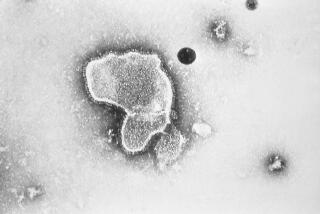Research Offers Hope of Vaccine for Multiple Sclerosis
- Share via
Researchers in San Diego have developed a vaccine against an animal disease that mimics the effects of multiple sclerosis in humans, according to an article in Thursday’s issue of Science magazine.
Continuing research in San Diego and elsewhere now suggests that doctors might one day be able to prevent and treat diseases such as MS and diabetes, both of which occur when the body’s immune system goes awry.
MS is a chronic disease that causes weakness, tremors and paralysis. It affects as many as 250,000 Americans and about 10,000 new cases are reported annually in the United States. There is no cure for it.
Researchers at Immune Response Corp., the small, La Jolla-based company where much of the research is being conducted, declined Thursday to talk about the article. The privately owned company is filing its initial public offering, and federal regulations temporarily prohibit officials from discussing the research, a spokesman said.
However, a scientist in Portland who is conducting similar research described the San Diego group’s report as “extremely important.”
“We found it very encouraging that (the San Diego researchers) found the same effects using their approach,” said Dr. Arthur Vandenbark, a researcher at the Portland Veterans Affairs Center. Vandenbark and two other researchers last month reported on a similar vaccine advance in a Nature magazine article.
The San Diego-based researchers and the Portland group are using synthetic molecules to immunize mice against experimental allergic encephalitis (EAE), an animal virus that produces MS-like symptoms.
MS and EAE occur when the body is attacked by its own immune system. In both diseases, cells that normally keep organisms healthy by destroying foreign cells inexplicably attack nerve cells and cause neurological diseases.
Researchers in the past have tried to combat the diseases with medications that keep the immune system from acting abnormally. But those treatments are the equivalent of “using a sledgehammer to blast the immune system,” Vandenbark said.
Researchers in San Diego and Portland believe their advances could lead to a vaccine--and, possibly, a cure--that would “selectively turn off” individual parts of the immune system. “We’re refining our ability to selectively regulate the immune response system rather than” use the sledgehammer approach, Vandenbark said.





